Echoing my thoughts from earlier in the week, my gratitude as well as my perspective has only grown after participating in a full week of discussion, presentations, and negotiations at COP27. The Conference of Parties allows for a unique insight into the forefront of climate conversations and innovation. While it may seem as though people are acting independently in regard to sustainability and addressing climate change, ideally there are larger frameworks behind the actions of individuals, nations, and actors.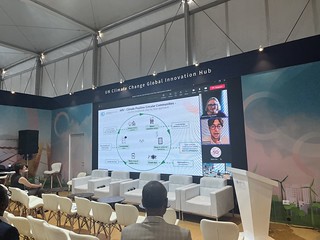
The major framework present at COP is the goals set by each country, which are self-determined and administered in the form of Nationally Determined Contributions, NDCs. NDCs are living documents that each nation in the Paris Agreement draft that outline their individual goals in regard to their reducing their contributions to climate change. I had the opportunity to hear further about the opportunities for partnerships between the U.S. and developing nations while attending events that included speakers from the NDC partnership. While there are mechanisms for support associated with the NDCs, there is no true accountability. This can lead to the creation of ambitious goals, with little action. Especially when nations in the Global North seem to be offsetting responsibility, by aiding developing nations that ultimately have much smaller carbon footprints rather than minimizing their emissions and recognizing their massive contributions to the climate crisis. To date, the NDCs have been the most successful framework for climate action than a climate conference, but there are flaws that stall progress.
Another framework that I was able to see was the urban implementation cookbook. On the last day, I attended “Taste Test: a First Look-back on the Urban Implementation Cookbook” at the UN Global Innovation Hub. It explained urban planning and creating sustainable cities through a cooking metaphor. The metaphor is intended to be an accessible and universal framework that can be applied at various scales. It includes conceptualizing the menu, accessing kitchen capacity, selecting an adaptable recipe, shopping for additional ingredients, creating the dish, sharing the recipe, and updating the menu. The framework itself is cyclical in nature, so it can be applied no matter the stage of the project. I found the presentation fascinating, but there was a lag between the creation of this framework and having access to true resources. There also seemed to be minimal pathways to collaboration and implementation. When I had a chance to speak shortly with one of the panelists following the event they mentioned building intercity collaboration as a next step. Within the presentation itself they highlighted that they hope to have further scaling of the framework itself by COP28. While there seems to be a commitment to progress and advancement there needs to be a greater sense of urgency and immediate action.
I found that these two examples of frameworks are indicative of the larger outcomes of the conference, while there is a large amount of discussion of potential pathways and determination of potential options there need to be subsequent, and rapid implementation. Now there are comprehensive frameworks in place, and we are now in a position where there needs to be collective international action to make true progress. As someone who is interested in the intersections of environmental science and policy, these frameworks seem to lack a regulatory structure or mechanism to ensure compliance or measure progress. That is a challenge with a wicked problem, like climate change. There are many different actors and since it is a global problem, there is no one enforceable regulatory body, with legislative capacities, that can ensure compliance. We are reaching a critical point that will hopefully lead to action and compliance on the part of individual nations. I have left the conference with a greater sense of urgency, but also a better understanding of the truly complex nature of international relations. Attending COP27 will be an experience that will undoubtedly impact the rest of my life and has encouraged me to think about sustainability in a broader context, but also to be critical of the current structures in place and expect more of world leaders.
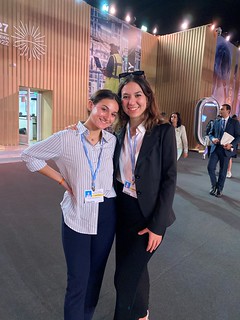 My hope for the future faltered originally on the very first day I attended the conference and listened to a panel about how corporations are resilient in the face of climate change. In this, there was simply no talk about the corporation’s plan for the future, or even what they’re currently doing to help reduce emissions and take part in the fight against climate change. Instead, all the speaker said were empty words that had no real meaning that fell along the lines of ‘we need to de-risk a small solution’ and that we must be ‘resilience multipliers,’ but what does that actually look like? What does that really mean? I remember being baffled at how little depth there was to the presentation, and walked out wondering if this was what the entirety of the COP27 discussions would be like. Thankfully, for the Earth and my sanity, it was not.
My hope for the future faltered originally on the very first day I attended the conference and listened to a panel about how corporations are resilient in the face of climate change. In this, there was simply no talk about the corporation’s plan for the future, or even what they’re currently doing to help reduce emissions and take part in the fight against climate change. Instead, all the speaker said were empty words that had no real meaning that fell along the lines of ‘we need to de-risk a small solution’ and that we must be ‘resilience multipliers,’ but what does that actually look like? What does that really mean? I remember being baffled at how little depth there was to the presentation, and walked out wondering if this was what the entirety of the COP27 discussions would be like. Thankfully, for the Earth and my sanity, it was not. 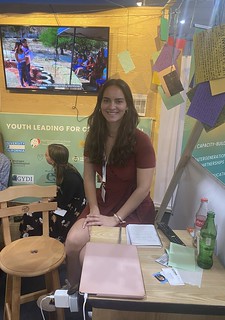
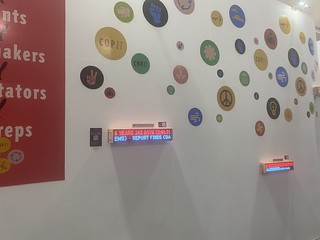 After my initial frustrations about not being able to contribute to international agreements, I realized change does not have to come about in such extravagant gestures. While the COP was a place for parties to meet internationally, it was also a place to share smaller successes that can be duplicated throughout local communities. I witnessed how youth were being involved in various spheres which made the problem of climate change not seem so daunting. Throughout my time at UConn I have been so focused on policy as the way to solve the climate crisis. What COP has put into perspective for me is that policy may be written and implemented by policy makers, but it is the attitude of the people that shape it. One way to shift such attitudes and accelerate the inclusion of new perspectives is through youth involvement and education. When kids can grow up learning about, experiencing and understanding our planet there is greater room for change. I always told myself I wouldn’t go into education. But I have since seen how influential my role in educating generations even beyond mine could be. Climate change is a crisis that my generation has inherited from generations before mine that did not deal with it. It is inevitable that the generations that come after mine will inherit the crisis however we choose to deal with it (or not). Climate change most likely won’t be solved in the next 30 years and even if it is, the Earth needs time to heal. One thing I hope I can do is leave the next generation with the adequate tools to continue on the work my peers and I are doing today. While this isn’t a path for myself that I have explored indepth, my time at COP has contributed to this new avenue.
After my initial frustrations about not being able to contribute to international agreements, I realized change does not have to come about in such extravagant gestures. While the COP was a place for parties to meet internationally, it was also a place to share smaller successes that can be duplicated throughout local communities. I witnessed how youth were being involved in various spheres which made the problem of climate change not seem so daunting. Throughout my time at UConn I have been so focused on policy as the way to solve the climate crisis. What COP has put into perspective for me is that policy may be written and implemented by policy makers, but it is the attitude of the people that shape it. One way to shift such attitudes and accelerate the inclusion of new perspectives is through youth involvement and education. When kids can grow up learning about, experiencing and understanding our planet there is greater room for change. I always told myself I wouldn’t go into education. But I have since seen how influential my role in educating generations even beyond mine could be. Climate change is a crisis that my generation has inherited from generations before mine that did not deal with it. It is inevitable that the generations that come after mine will inherit the crisis however we choose to deal with it (or not). Climate change most likely won’t be solved in the next 30 years and even if it is, the Earth needs time to heal. One thing I hope I can do is leave the next generation with the adequate tools to continue on the work my peers and I are doing today. While this isn’t a path for myself that I have explored indepth, my time at COP has contributed to this new avenue.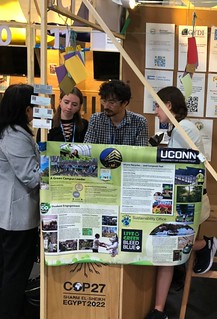 COP27 was one of the most meaningful weeks of my life. Full of dynamic challenges, I feel my worldview of climate change vastly evolved and broadened. COP27’s goals were to implement policies on adaptation and mitigation and loss and damages: two concepts I only tangentially worked with. I realized the importance of these missions when I heard this quote at the Ocean Alliance pavilion: “conservation without funding is just conversation.” Spending so much of my time at UConn connecting with the land, I feel I dismissed the financial aspect of climate change. It seemed unimportant when I could listen to the trees and the animals. But hearing the cries from people for the implementation of loss and damages, awakened me to the importance of finance. I attended a panel discussing financial changes since the adoption of the Glasgow Pledge during COP26. It was a contrasting panel: people from the global south passionately and desperately asking for progress at this COP and people from the global north indifferently talking about frivolous roadblocks to reparations and justice. So distributing that funding is immensely important to conservation work. Without that action, we are simply engaging in tedious conversations that don’t further climate policy whatsoever. COP27 opened my world to a whole new sector of sustainability.
COP27 was one of the most meaningful weeks of my life. Full of dynamic challenges, I feel my worldview of climate change vastly evolved and broadened. COP27’s goals were to implement policies on adaptation and mitigation and loss and damages: two concepts I only tangentially worked with. I realized the importance of these missions when I heard this quote at the Ocean Alliance pavilion: “conservation without funding is just conversation.” Spending so much of my time at UConn connecting with the land, I feel I dismissed the financial aspect of climate change. It seemed unimportant when I could listen to the trees and the animals. But hearing the cries from people for the implementation of loss and damages, awakened me to the importance of finance. I attended a panel discussing financial changes since the adoption of the Glasgow Pledge during COP26. It was a contrasting panel: people from the global south passionately and desperately asking for progress at this COP and people from the global north indifferently talking about frivolous roadblocks to reparations and justice. So distributing that funding is immensely important to conservation work. Without that action, we are simply engaging in tedious conversations that don’t further climate policy whatsoever. COP27 opened my world to a whole new sector of sustainability. My time in Sharm El-Sheikh was a display of the progress made in the fight for climate justice, but a sobering reality of how much further we have to go. I came to the conference with a desire to see ardent talks making monumental progress, but I was faced with stolid negotiations focused on the minutiae rather than tangible, large-scale solutions. Everytime I sought progress, I was met with compromise. Perhaps the zenith of COP27 was the announcement of a “Loss and Damage” fund intended to assist those countries most affected by climate change. Yet, there is no clear indication of who will pay into the fund, where the money will come from, or who will benefit.
My time in Sharm El-Sheikh was a display of the progress made in the fight for climate justice, but a sobering reality of how much further we have to go. I came to the conference with a desire to see ardent talks making monumental progress, but I was faced with stolid negotiations focused on the minutiae rather than tangible, large-scale solutions. Everytime I sought progress, I was met with compromise. Perhaps the zenith of COP27 was the announcement of a “Loss and Damage” fund intended to assist those countries most affected by climate change. Yet, there is no clear indication of who will pay into the fund, where the money will come from, or who will benefit.
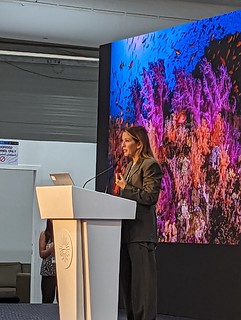 Sharm-el-Sheikh, the location of COP27, is a coastal Egyptian resort town that is adjacent to the Great Fringing Reef. Located in the cooler waters of the Red Sea, this reef is one of the most resilient reefs in the world; it is no surprise that COP27 publicity and advertisements repeatedly featured images and videos of the beautiful and vibrant underwater world. On one panel, “Hope For Coral Reefs,” singer-songwriter Ellie Goulding praised the reef’s “sheer visual beauty” and encouraged the audience to “please experience this reef yourself.” Yet at a conference where activisists and negotiators are working long days– and sometimes overnight– there seemed to be little time left to enjoy the beauty of nature.
Sharm-el-Sheikh, the location of COP27, is a coastal Egyptian resort town that is adjacent to the Great Fringing Reef. Located in the cooler waters of the Red Sea, this reef is one of the most resilient reefs in the world; it is no surprise that COP27 publicity and advertisements repeatedly featured images and videos of the beautiful and vibrant underwater world. On one panel, “Hope For Coral Reefs,” singer-songwriter Ellie Goulding praised the reef’s “sheer visual beauty” and encouraged the audience to “please experience this reef yourself.” Yet at a conference where activisists and negotiators are working long days– and sometimes overnight– there seemed to be little time left to enjoy the beauty of nature. At the same time, it is important to recognize the privilege and responsibility that comes with being able to attend COP27. Very few people have the opportunity to travel to the conference, and it is especially rare to be able to do so as a student. To have spent a week in a hotel along the coast of the Red Sea was amazing, with that luxury in juxtaposition with many of the stories told by activists from communities where significant impacts from climate change are already being felt. However, I also believe that the coming together of activists, politicians, negotiators, citizens, and indigenous peoples from around the world in one place is invaluable, and that finding joy in the world around us is necessary to sustaining activism. Particularly as frustratingly little progress was made on reaching a 1.5 degree warming target, it is important to take time to reset for the continued fight for a more equitable and sustainable future.
At the same time, it is important to recognize the privilege and responsibility that comes with being able to attend COP27. Very few people have the opportunity to travel to the conference, and it is especially rare to be able to do so as a student. To have spent a week in a hotel along the coast of the Red Sea was amazing, with that luxury in juxtaposition with many of the stories told by activists from communities where significant impacts from climate change are already being felt. However, I also believe that the coming together of activists, politicians, negotiators, citizens, and indigenous peoples from around the world in one place is invaluable, and that finding joy in the world around us is necessary to sustaining activism. Particularly as frustratingly little progress was made on reaching a 1.5 degree warming target, it is important to take time to reset for the continued fight for a more equitable and sustainable future.